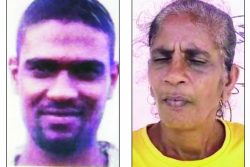Dear Editor,
Kahlil Gibran once said, “We choose our joys and sorrows long before we experience them”. He was certainly speaking to Guyanese who collectively know Guyana needs a new constitutional arrangement that will serve all its people. Yet we continue with the sorrows of a colonial divide-and rule winner-take-all anti-human rights constitution. Guyana needs a new constitutional arrangement that will heal Guyana’s racial rift and encourage, facilitate and ensure nation building. Guyana needs a new constitutional arrangement that can help us navigate the “rapids and cross-waves” of global geopolitics, especially since we are an oil producing nation.
The next elections must set the stage for a vibrant inclusive prosperous Guyana that is at peace with itself. This is only possible if none of the major political parties obtains a majority of Parliamentary seats at the next elections. The striking evidence is full in our faces: the APNU received approximately 49% of the vote at the last election and has zero power in Parliament. This is not democracy. This is hypocrisy. This belies a shared set of values. As Nelson Mandela said, “I have fought against white domination, and I have fought against black domination. I have cherished the ideal of a democratic and free society in which all people live together in harmony and with equal opportunities. It is an ideal which I hope to live for and to achieve”.
What Guyana needs at the next elections is Parliamentary shared governance as this is the only path to ensure shared governance is enshrined in our next constitution. If neither of the parties or coalitions obtain 50 % of the vote, then shared governance would result, since a national budget cannot be passed without consent of the other. Critically, no single political party would be able to unilaterally access the Sovereign Wealth Fund as is the practice today. Winner-take-all politics has been a ferocious cancer in Guyana. It is a pernicious system that breeds and rewards ethnic domination and greed. Bad political systems cough up bad political leaders, and when leaders are empowered by ethnic communities, the worst form of governance results. Witness our 186 years since Emancipation.
There is an inconvenient truth about Guyana that is known throughout the world. This inconvenient truth is that Guyana is a deeply divided racial society. The United Nations has said so. Former President Jimmy Carter has said so. Ethnic voting and a winner-take-all system nurtures and rewards bad governance. Without an inclusive form of governance, Guyana is destined for conflict and failure. Our leaders seem not to know history. Guyana’s motto or mission statement is “One People, One Nation, One Destiny”. It is a motto that speaks of Nationhood. It is a motto that speaks of Unity. It is a motto that speaks of Equality. It is a motto that speaks of Justice.
A winner-take-all system is about winners and losers. Not winners and winners. It is about disunity. Our winner-take-all system is incompatible with our motto or mission statement. It is incompatible with developing shared values, shared goals, shared expectations and shared benefits. Winner-take-all nurtures promotes, rewards and institutionalizes racism and racial conflict. An inclusive form of shared governance is necessary for sustainable inclusive development. We can speak about ethnic audits of national resources till the cows come home. What is needed is visionary high IQ, high EQ leadership. This does not exist. Elections are essentially an ethnic census in Guyana best summarized by the great Martin Carter in his poem “This is the dark time, my Love”.
Guyana’s winner-take-all colonial divide-and rule-Westminster system will eventually lead to an intolerable gap between a small rich ethnic elite and the masses of poor. What is occurring right in front of our eyes is vicious bi-racialism and not the “One People, One Nation, One Destiny” philosophy of multi-racialism. Our historical journey through enslavement and indentureship along with the purposeful mistruths of our historical narrative have provided a suitable platform for nurturing racism. And racism is a crime as much as it is a human frailty. Racism undermines all human rights. Racism has plagued Guyana because of an incorrect historical narrative that has been promoted and maintained by racial entrepreneurs. Racism and democracy are incompatible realities. Yet, this is the reality of Guyana.
In 2016, I wrote a Letter to the Editor entitled “Towards a Just and Caring Guyana” in which I proposed a new constitution that can heal the nation. Now in 2024 during Emancipation Month and during our 58th Anniversary of Independence, we are very far away from “a just and caring Guyana”. Slogans that camouflage our true reality seem to be the political masquerade to hide this sordid truth. The most recent National Elections revealed the depth of the racial divide in Guyana. Yes, the same people who indigenized Guyana and lost 473,000 lives over 200 years of the criminal enterprise called “chattel slavery” were called other belligerent racist names. It seems that history is not being taught in Guyanese schools resulting in this benign schizophrenic behaviour among young and old. No one has taught them that without the horrific deaths and sacrifices of Africans in Guyana for over 200 years, the freedom of all other races in Guyana would have been impossible.
Worse still, after the 2020 elections, political leaders, church leaders and the international community did not speak out on this deeply held beliefs and profound racism signifying an indifference reminiscent of Hitler’s time. There were over 28 such horrible racist comments, some on YouTube by 5-year-old children, egged on by their mothers. I have kept these statements because, regardless of the “One Guyana” political mantra, these wounds are extremely deep and have ancestral resonance.
Shibata Yoshiko of Kobe University, in his 2002 paper entitled “Race Consciousness and the Formation of National Identity in Modern Guyana”, stated “Guyana needs a process of genuine reconciliation and integration as it is now necessary to form a non-racialist national identity”. He also stated that “Essentialist models of racial and cultural authenticity dangerously ignore diversity and hybridity”. We saw this slippery slope at Emancipation. Any government or political party that tries to create a “One Guyana” to replace our motto of “One People, One Nation, One Destiny” without understanding the root causes of our historic inter-ethnic rivalries, driven by winner take all politics, will fail.
If Guyana does not create its own revolutionary path to sustainable inclusive economic and political stability, then it will be subjected to global externalities far beyond its control. Oil is a great example of these externalities. Once a country has oil, geopolitics will always trump local politics. Will Guyana become an existential form of Gaza? At the next elections, I hope there are three strong parties so that no party obtains 49% of the vote. This would be the greatest gift to Guyana and its People. Guyana cannot afford anything else. As a scientist, I am bewildered how three undemocratic parties, given their history and internal dynamics, can individually govern a democracy. This is the tragedy of Guyana. We need to stop being “victims of our past and become pioneers of our future”.
The next elections are Guyana’s most critical elections. Many of our politicians are mentally at rest. Some are mentally at sea. Some are without a moral compass. May our ancestors intervene and bring peace, prosperity and shared benefits to Guyana. Guyana needs to pursue “common ground” in order to achieve the vision of a plural democracy: a multi-racial, multi-ethnic, multi-cultural multi-party society in which every Guyanese, regardless of age, race, religion or creed, has an equal opportunity to realize his or her enormous potential in a peaceful manner.
Such common ground cannot be driven by a “slogan” half the population rejects because they feel excluded from the economic prosperity of the country. “Common ground” is about the need to encourage equity for all by promoting and nurturing individual initiative regardless of race, religion or class and that will ensure no person will be discriminated against or given special privileges. Sadly enough, many Guyanese live today in the bondage and heritage of an inglorious past history. The beginning of this process of good governance begins with three strong political parties at the next elections so that neither of them receives more than 49% of the electorate.
Our current electoral process prevents post-election coalitions and hence the only viable path to changing the constitution is with no party receiving a majority in Parliament and hence no budget or access to the Sovereign Wealth Fund can be achieved without a legal agreement to change the constitution as the current 2/3 Parliamentary vote to change the constitution will never be achieved if there is a Party or coalition group with more than 50% of the seats in Parliament. Will we choose to choose joy or more sorrow and more political slogans that falsifies our reality imprisons us all? The rest of the world is not fooled by slogans.
Sincerely,
Eric Phillips
1990-91 White House Fellow






